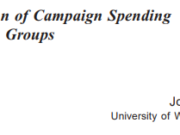Four years ago Mr. Obama barred corporations from donating to his inauguration, a gesture meant to show that well-heeled interests wouldn’t have undue influence in his administration. For the 2009 events he raised more than $50 million from other donors to help cover the costs of celebrations.
But the climate is different now. The economy is still struggling, and the president’s campaign donors are drained from a long election season in which they were also asked to help fund the Democratic convention in Charlotte and congressional races.
Obama fundraisers and campaign advisers cite various reasons for accepting corporate money this time around. Dropping the ban on corporate contributions would ease the task of raising the tens of millions of dollars needed to pay for celebratory events that have become a fixture of presidential inaugurations.
The article continues:
They also describe the inauguration as more of a civic event than a partisan political affair. Just as corporations underwrite museum exhibits that provide a public service, they should be permitted to pay for various inaugural events, these people said, adding the donations can help limit the cost of inaugural events to taxpayers.
Public outcry over corporate involvement in politics was at an all time high during this last campaign season. Although the inauguration is not an overtly partisan affair, how is funding the winning candidate’s victory parties after the inauguration any less corrupting than a direct campaign contribution? It’s not as if the potential for political influence and favoritism magically disappear post-election. This is by no means a call for regulatory oversight of this kind of spending; rather, simply an observation that the notion of “money in politics” doesn’t end on election night.














